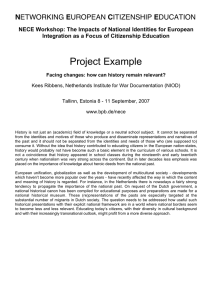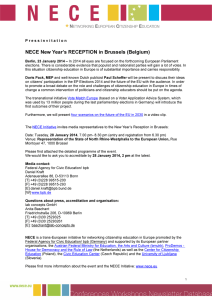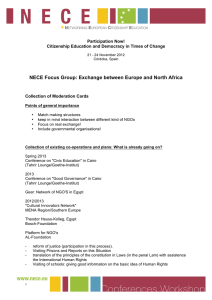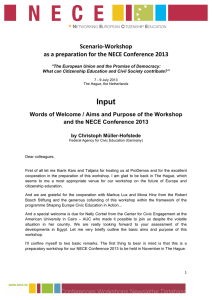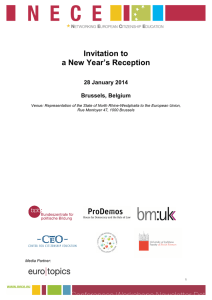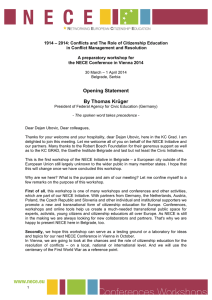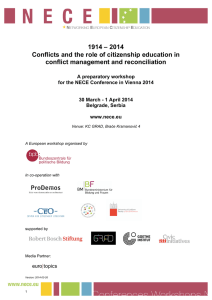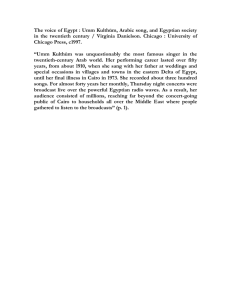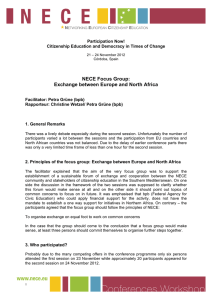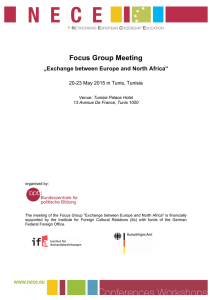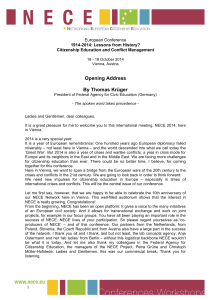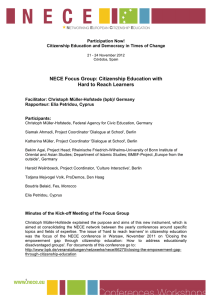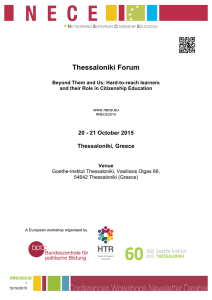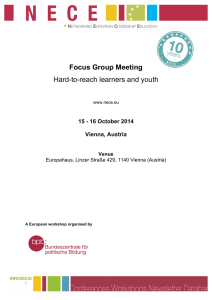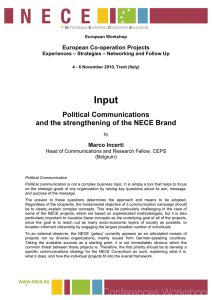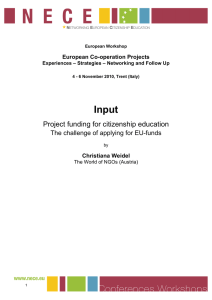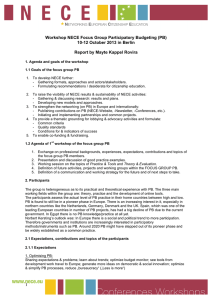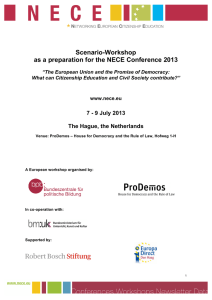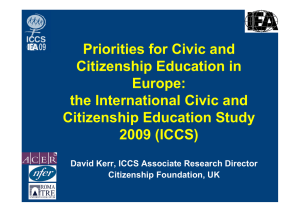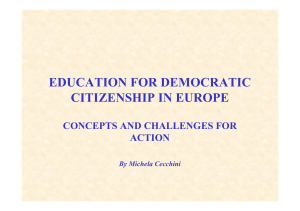Document 11530098
advertisement
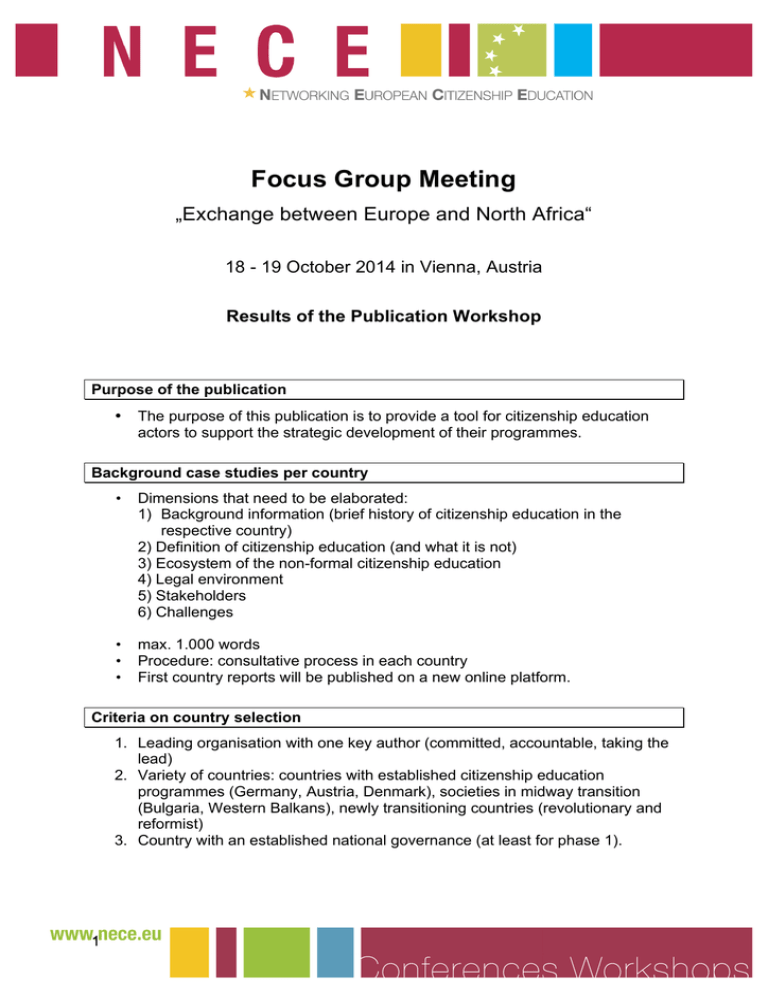
Focus Group Meeting „Exchange between Europe and North Africa“ 18 - 19 October 2014 in Vienna, Austria Results of the Publication Workshop Purpose of the publication • The purpose of this publication is to provide a tool for citizenship education actors to support the strategic development of their programmes. Background case studies per country • Dimensions that need to be elaborated: 1) Background information (brief history of citizenship education in the respective country) 2) Definition of citizenship education (and what it is not) 3) Ecosystem of the non-formal citizenship education 4) Legal environment 5) Stakeholders 6) Challenges • max. 1.000 words • Procedure: consultative process in each country • First country reports will be published on a new online platform. Criteria on country selection 1. Leading organisation with one key author (committed, accountable, taking the lead) 2. Variety of countries: countries with established citizenship education programmes (Germany, Austria, Denmark), societies in midway transition (Bulgaria, Western Balkans), newly transitioning countries (revolutionary and reformist) 3. Country with an established national governance (at least for phase 1). 1 Country selection • Denmark • Egypt • Tunisia • Morocco • Germany • Bulgaria (Western Balkans) • Spain • Lebanon (tbc) • Poland • Czech • Slovenia • UK (tbc) • Austria • Netherlands DEDI Mona Shahien (Tahrir Lounge), GoetheInstitut Cairo, DEDI, Rana Gaber (Egyptian Youth Federation) Karima Rhanem (Moroccan Association for Development and Public Diplomacy), Elhossien Mahmoud (Hayaty NGO) bpb/ Dirk Lange Louisa Slavkova (Sofia Platform - Bridging Europe and the Middle East) Maram Hassan Anbar (Club de Madrid) NECE Partner: Alicja Pacewicz (Center for Citizenship Education) or colleague NECE Partner: Ondrej Matejka (Civic Education Centre) or colleague NECE Partner: Marinko Banjac (University of Ljubljana) David Kerr or Bryony Hoskins NECE Partner: Sigrid Steininger (Ministry of Education and Women’s Affairs) or colleague NECE Partner: Tatjana Meijvogel-Volk (ProDemos) or colleague Methodology for the consultation Set of criteria of stakeholders who should be consulted: • • • • • • • • • • Stakeholders to be present (but divided in relevance) Relevant government representatives Practitioners: teachers, NGO implementers (rural and urban), informal initiatives, university clubs, etc. Unions and syndicates Academia Target audiences (age group, gender, rural, urban) Relevant media representatives Political parties (?) - not for North Africa countries Donors with a history of working civic education Religious groups (case by case but must be representative of given society) Consultation does not necessarily have to be on one table. The goal is to draft a paper, which is to be validated in further steps. 2 Format of the publication • • • • pictures interactive format video application infographs Consult with the ‘media geeks’ for interactive format. Timeline 2015 End of January End of February End of March Mid of April Mid of May End May all national consultation have been held First draft of online structure first draft (1.000 words) to be sent to the editorial team Media committee (deciding on the format) Finalizing online platform Week of 13-19 April: Focus group meeting (proposal Tunisia): Feedback from editorial team translation final drafts published online Participants of the working group: - Reem Abu-Zaid (The Danish Egyptian Dialogue Institue) Moez Ali (Union des Tunisiens Indépendants pour la Liberté) Shahdan Arram (The Danish Egyptian Dialogue Institue) Nelly Corbel (The American University in Cairo) Amany El Hedeny (University of Cairo / Center for the Study of Developing Countries) Rana Gaber (Egyptian Youth Federation) Petra Grüne (Federal Agency for Civic Education) Mona Shahien (Tahrir Lounge@Goethe-Institut) Yara Shahin (The Danish Egyptian Dialogue Institute) 3
